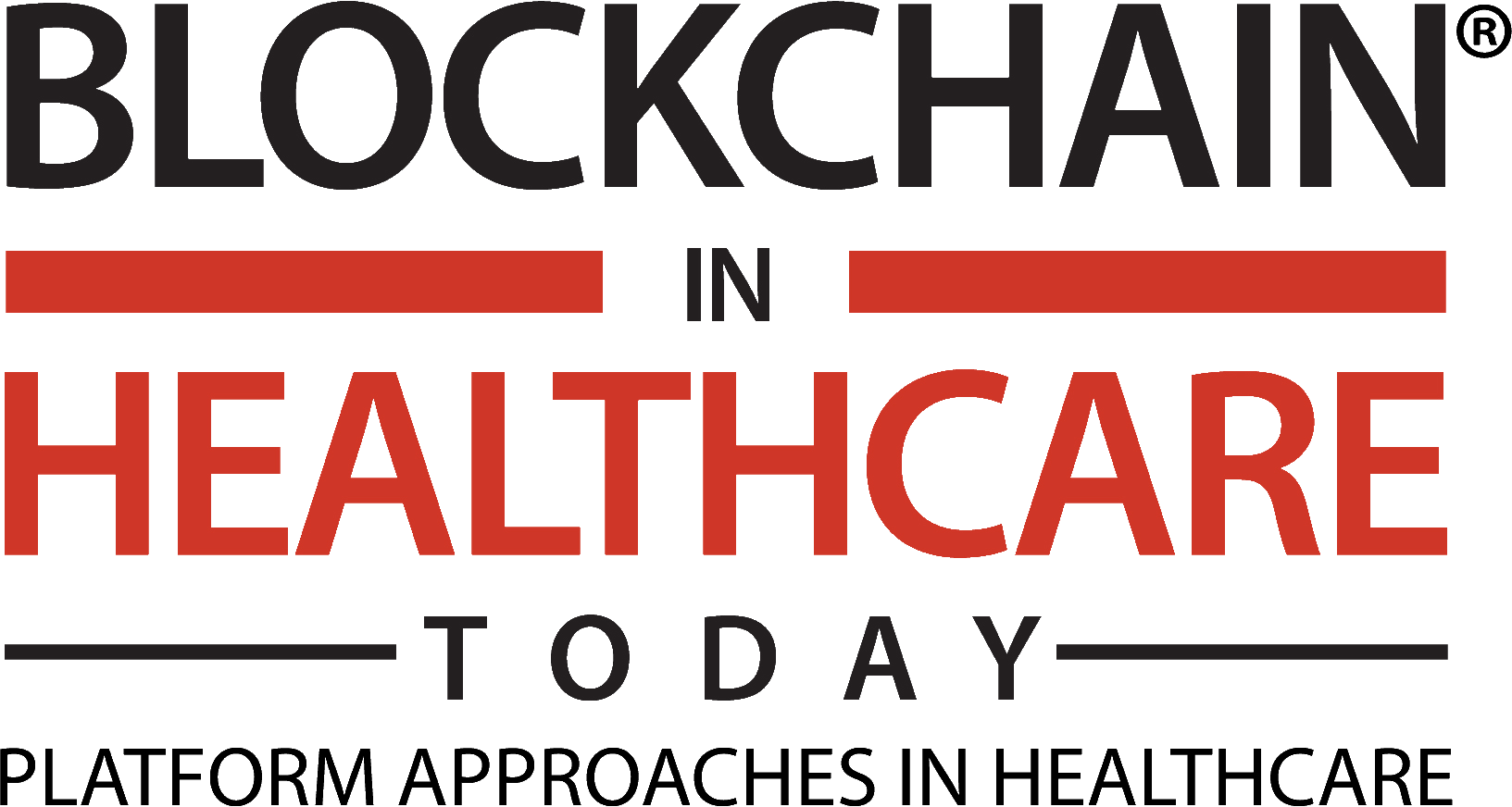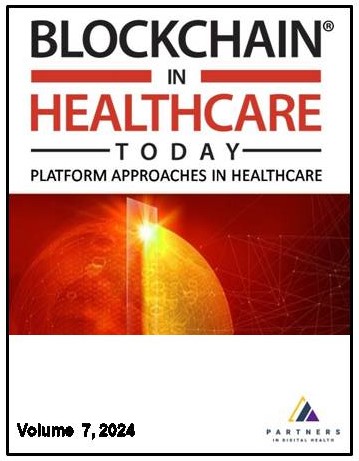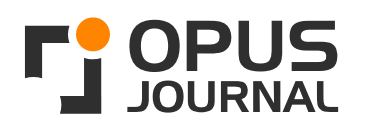Vol 7, No 3 (2024)
Published: 16.12.2024.
Blockchain in Healthcare Today (BHTY) is the leading international open access journal that amplifies and disseminates platform approaches in healthcare and distributed ledger technology research and innovations. Fields of interest include healthcare information systems, leveraging data science tools and techniques, interoperability, consent mechanisms, privacy preservation, security of health data, clinical trials management, supply chain management, revenue cycle automation, immersive technologies, tokenomics, governance, regulation, network technologies, clinical computing, cryptography, and failed experiments in this expanding specialty field of research.
Authors in this issue:
Cees Hesp, Charu Awasthi, Ingrid Vasiliu-Feltes MD, EMBA, Irum Feroz, Jennifer Hinkel, Jennifer Hinkel, MSc, CHW, FRSA, Laya Mahmoudi, Mohammad Mehraeen, Mohan Venkataraman, Muthu Ramachandran, Nadeem Ahmad, Olga Kubassova, PhD, Peter J. Pitts, Prashant Kumar Mishra, Robert Goldberg, Satya Prakash,
Archive
See all
Volume 7, Issue 3, 2024
Volume 7, Issue 2, 2024
Volume 7, Issue 1, 2024
Volume 6, Issue 2, 2023
20.12.2024.
Original Research
Tracing the Blockchain Challenges in Healthcare: A Topic Modeling and Bibliometric Analysis
The application of blockchain technology to healthcare offers promise in providing solutions to some key challenges related to data sharing, privacy, security, and access control. There are however several barriers preventing blockchain adoption from spreading widely, which has prompted research efforts. This study aims to conduct a bibliometric analysis of 196 documents, indexed in the Scopus database, to examine the structure, impact, contributors, and journals. Also, topic modeling is applied to give new knowledge on the latent topical structure of this literature. As a result, five critical challenges have been identified regarding the use of blockchain in healthcare including data privacy/security, scalability, governance, interoperability and standards, and cost.
Mohammad Mehraeen, Laya Mahmoudi
16.12.2024.
Conference Presentations
Leveraging Blockchain and AI for Pharma Supply Chain Efficiency
The presentation discusses the potential of blockchain and AI to revolutionize the pharmaceutical supply chain. The author, with a rich history in healthcare technology, highlights the inefficiencies and challenges faced by the industry, particularly in areas like drug discovery, manufacturing, and distribution. Blockchain technology, with its ability to create immutable records, can enhance transparency, traceability, and security across the supply chain. This can help in tracking the journey of drugs from raw materials to the final product, reducing the risk of counterfeiting and ensuring quality. AI, on the other hand, can optimize various processes, such as drug discovery, clinical trials, and supply chain logistics. By analyzing vast amounts of data, AI can identify patterns, predict trends, and make informed decisions. This can accelerate drug development, improve manufacturing efficiency, and optimize inventory management. The integration of blockchain and AI can create a powerful synergy, leading to significant improvements in the pharmaceutical supply chain. This includes enhanced patient safety, reduced costs, and faster time-to-market for new drugs. The presentation provides a concise view of the health care supply chain processes and discusses AI patterns such as RAG, GAM and Fine-Tuning methods such as LoRA and QLoRa that can help in building trust in the supply chain.
Mohan Venkataraman
16.12.2024.
Narrative/Systematic Review/Meta-Analysis
Systematic Review of Usability Factors, Models, and Frameworks with Blockchain Integration for Secure Mobile Health (mHealth) Applications
This systematic review examines critical usability factors that influence the adoption of mobile health (mHealth) applications among older adults and identifies gaps in current usability models, including ISO 9241-11, Nielsen’s heuristics, and PACMAD. This review also explores the potential role of blockchain technology in enhancing multimodal medical data systems within mHealth applications. A comprehensive search across six databases yielded 1,073 studies, with 60 meeting inclusion criteria. Studies were analyzed through thematic synthesis to identify key success factors (RQ1) and comparative analysis to assess limitations in existing frameworks (RQ2). Key factors promoting mHealth adoption included ease of use, efficiency, error prevention, learnability, memorability, and user satisfaction. Blockchain integration emerged as a promising approach to improve data security, interoperability, and user trust, particularly for older adults who engage with complex, multimodal health data. Findings from RQ2 highlighted gaps in usability models, such as the lack of age-specific guidance for multimodal interaction, error recovery, and data privacy. These results underscore the need to define a new usability framework and incorporate blockchain to meet the unique needs of older adults in mHealth applications, supporting both secure and accessible healthcare management.
Irum Feroz, Nadeem Ahmad
31.12.2024.
Original Research
A Secure and Reliable Fog-Enabled Architecture Using Blockchain With Functional Biased Elliptic Curve Cryptography Algorithm for Healthcare Services
Fog computing is an emerging technology that extends the capability and efficiency of cloud computing networks by acting as a bridge among the cloud and the device. Fog devices can process an enormous volume of information locally, are transportable, and can be deployed on a variety of systems. Because of its real-time processing and event reactions, it is ideal for healthcare. With such a wide range of characteristics, new security and privacy concerns arise. Due to the safe transmission, arrival, and access, as well as the availability of medical devices, security creates new issues in the area of healthcare. As an outcome, fog computing necessitates a unique approach to security and privacy metrics, as opposed to standard cloud computing methods. Hence, this paper suggests an effective blockchain depending on secure healthcare services in fog computing. Here the fog nodes gather the information from the medical sensor devices and the data is validated using smart contracts in the blockchain network. We propose a Functional Biased Elliptic Curve Cryptography Algorithm (FB-ECC) to encrypt the data. The optimization is performed using Galactic Bee Colony Optimization Algorithm (GBCOA) to enhance the procedure of encryption. The performance of the suggested methodology is assessed and contrasted with the traditional techniques. It is proved that the combination of fog computing with blockchain has increased the security of data transmission in healthcare services
Charu Awasthi, Satya Prakash, Prashant Kumar Mishra
16.12.2024.
Special Report: Guidelines, Consensus
Ethics of Blockchain by Design: Guiding a Responsible Future for Healthcare Innovation
The rapid evolution of blockchain technology within healthcare presents unparalleled opportunities for advancements, including enhanced patient data security, decentralized systems for trustless operations, and transparent supply chain management. However, as blockchain reshapes the healthcare landscape, it demands a robust ethical framework that guides its design and implementation. "Ethics of Blockchain by Design" emphasizes embedding ethical principles at the heart of blockchain innovation, fostering public trust, equity, and long-term societal benefits. This paper also proposes a set of best practices guidelines on ethics of blockchain by design.
Muthu Ramachandran
16.12.2024.
Editorial
Predictions for 2025: Artificial Intelligence in Modern Drug Development, Quantum Proof Encryption, and Health Data Monetization
We are witnessing an unprecedented convergence of scientific discoveries, technology innovations, exponential adoption of technology and remarkable population demographic shifts towards a digitally native society. The Noble Prizes in medicine, chemistry, physics awarded this year further validated the profound impact of technology on healthcare and life sciences. For 2025-designated by the United Nations as The Year of Quantum Technology, we can envision further technology-driven innovations in all domains, triggering the transition to a novel health ecosystem. The role of AI in modern drug development, the demand for quantum-proof encryption, and the opportunities of blockchain in health data monetization are all trends can be disruptive for pharma, healthcare and healthcare finance.
Ingrid Vasiliu-Feltes MD, EMBA, Jennifer Hinkel, MSc, CHW, FRSA, Olga Kubassova, PhD


